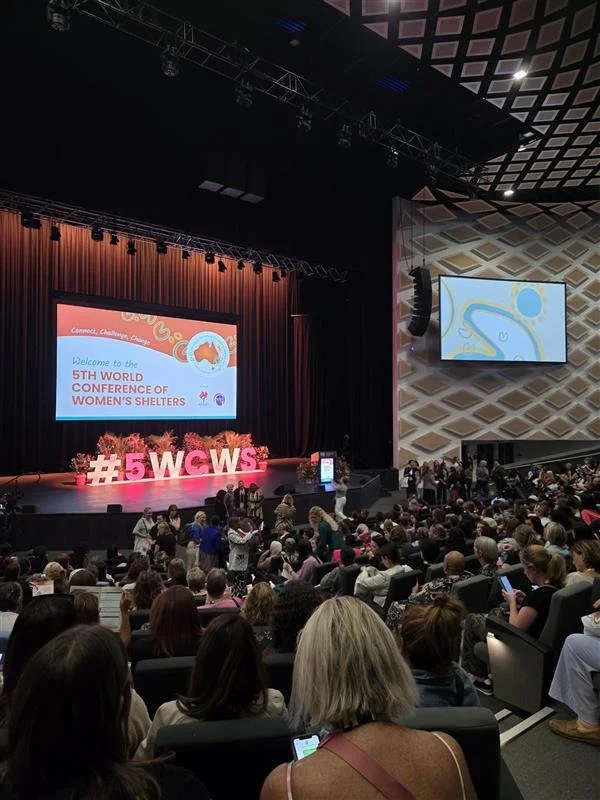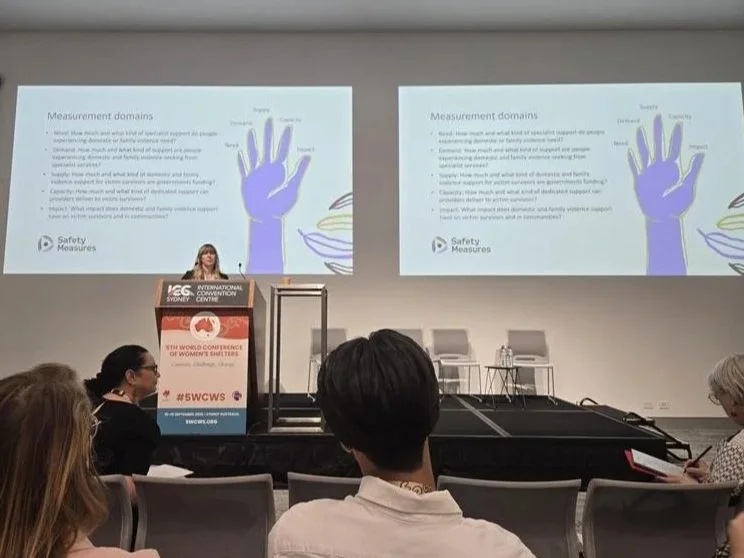Safety Measures Attends 5th World Conference of Women’s Shelters in Sydney
In September, three members of our team had the privilege of attending the 5th World Conference of Women’s Shelters in Sydney, joining over 1,000 delegates from more than 60 countries.
The event brought together frontline workers, researchers, and advocates from around the globe, offering a rare opportunity to learn from a wide range of international perspectives on supporting people experiencing violence.
Program Director Louise presented on Safety Measure’s context and work so far, which led to valuable conversations about the importance of data collection and the need to better understand how services are funded.
Key takeaways/highlights
Examples from the across Australia and internationally had us thinking about data collection in domestic and family violence services on a large scale, and lessons from these experiences about methodology and avenues for advocacy:
USA’s National Network to End Domestic Violence has been conducting an annual census of adults and children seeking DFV services for 20 years
Women’s Shelters Canada is currently conducting their second national survey of women’s shelters across the country. Building on their first report, this survey will add to the national data picture to help tell the story of sector, identify trends and strengthen advocacy
The work of Beryl Women Inc in ACT on their Cultural Charter and what embedding Aboriginal leadership within non-Aboriginal services can look like. For our team, this connected directly to broader conversations about practicing Cultural Safety and how “mainstream”, or non-Aboriginal, services approach their work with Aboriginal clients with nuance and care.
Djirra, Elizabeth Morgan House and Safe and Equal’s presentation about partnering to uphold self-determination in their work to support non-Aboriginal services to take meaningful action toward building a culturally responsive and accountable specialist family violence sector in Victoria. For our team, deepening our understandings of the breadth of DFV work across ACCO and non-ACCO organisations, it was particularly important to hear how services can come together in support of a whole sector.
We were also impressed and inspired by the work of a network of remote shelters in northern Queensland, led by Warringu Aboriginal Corporation. Coming together to share insights and resourcing, this network shows what’s possible through connection and collaboration, which felt particularly relevant for our work across jurisdictions, as well as recognising the unique work that is happening in remote shelters and safe houses across SA and NT, and how networks of these organisations can be supported
Hearing from Annie North, a refuge operating in Central Victoria for over 30 years was especially valuable for our team, in understanding the models and frameworks that underpin a service that has operated over such a significant period
Rethinking Risk - learnings from Women’s Refuge New Zealand
A particularly memorable presentation for me was the work of Women’s Refuge New Zealand. Dr Natalie Thorburn and Cleo Arathoon were really engaging in presenting their research with over 1700 women and non-binary victims in shelters across NZ. This work looked at how risk and safety are experienced by victims but also how DFV support can act as a ‘bridge’ between risk and safety. Findings from this report outline that DFV services can increase safety by providing support that is practical, timely and tailored to the needs of individual victims.
This work challenged the way I think about risk and safety beyond concepts of ‘risk of lethality’. It also highlighted that in the reality of seeking help, other types of risk can emerge. Additionally – that the impact of violence can last long after violence has ‘stopped’, and that this impact can be felt in multiple ongoing domains. This work had particular relevance for our team’s thinking about how to measure ‘impact’ of DFV support services as it is understood by victim survivors. We are looking forward to exploring these concepts further with survivor advocates and service providers as we develop language and understandings around client outcome measurement frameworks.
Safety Measures team members at the conference: Shaez Mortimer, Rebecca Naylor and Louise Simms
International conferences like this reinforce the importance of coming together to exchange ideas and build on each other’s strengths. We’re excited to take what we’ve learned into our ongoing work, and as a team are hopeful to be able to share findings from our own work at a future event like the 6th World Conference, wherever that may be!



